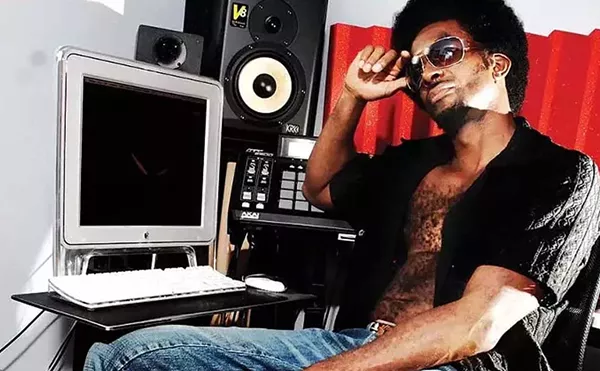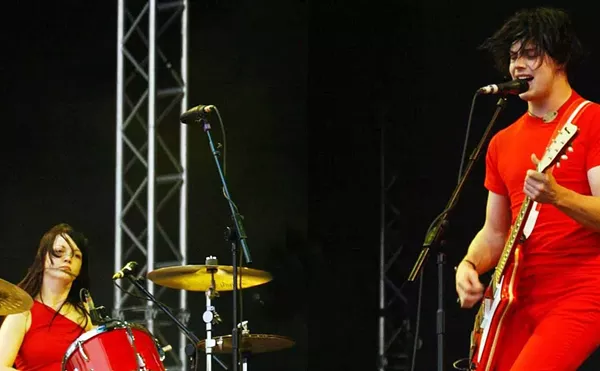
Audio By Carbonatix
[
{
"name": "GPT - Leaderboard - Inline - Content",
"component": "35519556",
"insertPoint": "5th",
"startingPoint": "3",
"requiredCountToDisplay": "3",
"maxInsertions": 100,
"adList": [
{
"adPreset": "LeaderboardInline"
}
]
}
]
Sonny Landreth takes a moment to ponder the question. Like most naturally gifted people, he fails to see what the fuss is about, and answering the inquiry about his status as a “guitar hero” just makes him feel weird.
It’s not to say that Landreth — one of the finest living bluesmen — isn’t honored by the admiration.
“I guess that if you work at something so hard for your whole life, it’s nice to be acknowledged,” he says.
If Landreth just thinks he’s one of the gang, his fans see things differently. To them, there’s something metaphysical about the sound of Landreth’s slide guitar that separates him from the pop-music-weary throngs of recording artists. The cognoscenti say it’s a voice.
Born in 1951 in the nucleus of the American blues scene, Jackson, Miss., then shuffled to Lafayette, La., while in the second grade, Landreth’s bearings would have a major influence on his trajectory. He grew up as part of the generation that claimed the works of Elvis Presley and the Beatles as “their music,” and he was reared in a region whose musical lushness is was as thick and tangled as the swamps that surrounded it.
“It’s a cultural outback,” says Landreth of his home state.
He would be introduced to a potpourri of music at an early age.
“I started playing the trumpet when I was 10,” says Landreth.
Though he refers to the trumpet as his “academic instrument,” he admits that his formal matriculation came from the school of Delta blues and Cajun music.
“I didn’t even know I was doing it at first,” he admits, “but when I started playing the guitar, I realized that I was trying to emulate the sound of a human voice. [The guitar] offered enormous potential.”
This “potential” would facilitate nothing short of an innovation in slide guitar sound. With a synthesis of technique and stamina that churned out nothing but tonal essences, Landreth skipped the mechanics of guitar playing and homed in directly on its aesthetics. His use of open tunings and a “slurring” string sound created a vibe that no one before or after him has replicated.
“Yes, we’re kindred spirits,” says Landreth of his relationship with his six-stringed companion, “but when I dream about songs, I am not just focused on the guitar.”
Makes sense. His sound is so organic, it’s difficult to pinpoint where the man stops and the instrument begins.
Such symbiosis undoubtedly came from years of steady gigging. At age 20, Landreth began working with outfits such as Clifton Chenier and his Red Hot Louisiana Band (he would be the first Caucasian to play with this beloved Zydeco group) and Huey Meaux. His reputation as a kid with chops preceded him.
He recorded his first album, Blues Attack, on Jay Miller’s Blues Unlimited label, in 1981. His sophomore effort, the Cajun-influenced Way Down in Louisiana, would become a favorite in the blues world four years later. But it did not free him from the confines of cult status, and his kudos would come almost exclusively from within “the circuit.”
Throughout most of the late ’80s and all of the ’90s, Landreth relied on his reputation to pay the bills, doing copious session work and showing up on the liner notes of some of the world’s most famous recording artists: Bonnie Raitt, Dolly Parton, Junior Wells, Kenny Loggins. In 1988, he joined John Hiatt on his acclaimed album, Slow Turning, and toured with Hiatt.
In 1992, Landreth’s Praxis/Zoo release, Outward Bound, offer the kind of rock ’n’ blues sound that increased the breadth of his popularity. But it wasn’t until 1995, with the release of the album I-10, that Landreth finally penned the song that would define his ethos. The gritty “Native Stepson” from I-10 is revered by blues lovers the world over.
Eight years later, Landreth got the biz’s “official” slap on the back; 2003’s The Road We’re On garnered him his first Grammy nomination. Though he failed to bring home the bronze Victrola that night, the exposure enlarged his space on the map.
The appreciation for Landreth’s music is almost always worth the wait:
“[Landreth] is probably the most underestimated musician on the planet, and also probably one of the most advanced,” says Eric Clapton.
Asked about his famous fan’s compliment, Landreth is speechless.
“I am still at the point where I feel like I need to stay at the top of my game, I have to make an effort to improve,” he says.
To anyone who has ever picked up a guitar — and to many who have not — the idea that Landreth could improve on his craft seems remarkable. But if we sit back and listen that voice, maybe we’ll hear what he means.
Sonny Landreth will perform at Tenny Street Roadhouse (22361 W. Village Drive, Dearborn) on Thursday, Mar. 25. Call 313-278-3677.
Eve Doster is the listings editor of Metro Times. E-mail edoster@metrotimes.com.




